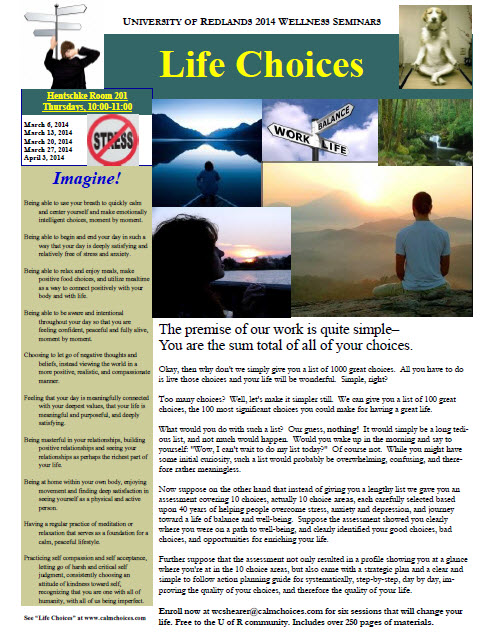Approximately 25 years ago, while developing methods to make couple therapy more effective, Bill "discovered" the concept of mindfulness. Actually, it's a concept that dates back at least 2500 years, but it proved to be just what Bill was looking for. It's not enough to have knowledge-based skills for dealing with others. "Knowing" the right thing to do often means little when powerful emotions are aroused. Often the crucial factor in being masterful in relationships is the ability to be self-aware and self manage – in other words being mindful and acting with emotional intelligence. Mindfulness is a quality to be developed and a skill that applies to every aspect of life. We now include training in mindfulness skills in every aspect of our work. As a result, our work with stress, anxiety, and depression has been greatly enhanced.
A Mindfulness Story from "Life Choices"
Matt learned diaphragmatic breathing from Robin during his first session. It was magic! Previously stress and anxiety had seemed overwhelming and the effects were felt in his work-life, his relationships, and his health. His quality of life had been at an all time low and he didn’t like the life he was living. In fact, life seemed bleak and pointless, one stressful day after another with no enjoyment – just more stress.
The “breath work” brought about major changes. Matt hadn’t realized he had been breathing mainly from his upper chest, breathing becoming more rapid, shallow and irregular with increasing stress – and he was almost always stressed. In fact, Matt wasn’t much aware of his breathing at all until he began the practice. Spending just 10 minutes a day practicing diaphragmatic breathing, or “belly” breathing made him aware of his breathing 24-7. That awareness allowed him to catch himself being “up-tight,” that awareness in turn being a cue reminding him to plug-in a learned relaxation response, quickly lowering his level of stress and anxiety. Moreover, Matt had learned to take three deep diaphragmatic breaths whenever he was aware of being stressed, and the additional step worked wonders.
Matt had also been learning about “self-talk.” We all talk to ourselves, but most of us aren’t much aware of self-talk or the incessant inner chatter that typifies how the human mind works.
Our minds are always busy generating thoughts, and some of those thoughts are destructive. Matt learned we often disturb ourselves with automatic negative thoughts, or long held core beliefs that aren’t accurate and don’t serve us very well.
An epiphany! When he was up-tight, or in fight or flight mode (which was often the case), Matt wasn’t much aware of self-talk at all. It was only when he slowed himself down with the diaphragmatic breathing that he became fully conscious of things he was telling himself. He realized it wasn’t so much what was happening that was important, but what he was telling himself about what was happening. When calmer, he could actually observe his own thoughts, see them as only “stories” his mind was telling him, and choose a different and wiser direction.
Diaphragmatic breathing alone wasn’t enough, nor was redirecting his self talk in and of itself sufficient. It was a team effort – breathing diaphragmatically combined with different self talk dramatically lowered his stress. Doing one without the other was like having one foot on the accelerator and one foot on the brake. In combination however the results were dramatic. Matt discovered that he could breathe deep, slow, and regular, while talking to himself in a calm and self-soothing way, gently reminding himself: “It’s okay. Let it go. There is no emergency here.”
Matt realized self talk had a tone, and the tone was important. His thoughts could be loud, demanding, or scary, or they could be soft, gentle, and quiet. There was also an urgency and tempo. Matt became aware of having racing thoughts when he was stressed, or slowing his thoughts and focusing when he decided on a different direction. It was a choice. Breathe, slow down, and let go!
Exciting possibilities – Matt felt more in control of his life than ever before. It was quite a paradox. While desperately seeking control over his life, life seemed unmanageable. Letting go of volcanic struggling however, opened the door to a life of purpose, meaning, and satisfaction. What an insight! You have to give up control to actually find control.
Matt thought – this is great. Where do I go from here? Realizing that old habits die hard, and would resurface given the opportunity, Matt was eager to take this new learning further. In therapy, he learned that this process actually had a name – “mindfulness.”
It was a discipline, a skill that could be developed with practice. Mainstream culture and psychology seem to just now be discovering the power of mindfulness, but it was actually a 2500-year-old concept. Resources were plentiful, both in print, and on the Internet.
Matt had begun what was to become central to his life, a journey of self-awareness, a journey of transformation.

In our work with eating disorders, anxiety disorders, relationship issues, and all addictions and compulsions, the concept of mindfulness takes center stage. Recovery and growth, and the achievement of emotional balance, regardless of the problem being addressed, cannot take place without developing mindfulness skills.
Being mindful simply means paying attention. It's tuning in with all your senses, calmly deferring action or judgment while you observe what is. It’s not having to do anything immediately. With a calm shift to full and focused awareness of internal thoughts, feelings, and physical states, as well as awareness of everything occurring around you, you become able to consciously and purposely participate in your reality in a powerfully positive and realistic way.
So, what do you do then with this state of mindfulness? How will being more aware and focused in a calm way help you transcend problems such as managing chronic stress, breaking the cycle of binge eating, eliminating panic attacks, or overcoming alcoholism? How will it help you break free from your resistance to growth toward a high level of well-being? How will it help you get rid of self-defeating behaviors such as emotional reactions that wreck relationships? How will it help you achieve balance and a state of peace and optimism?
That means taking control of severe anxiety states and achieving a high level of self calming skill that heads off panicky feelings before they really get going. It means managing conflicts and choosing to mindfully calm down, slow down, give up control, give up having to be right, give up having to win, give up having to fix anything, instead consciously choosing to pursue understanding and collaboration, finding real solutions and building great relationships in a truly masterful way.
Mindfulness means being conscious and intentional, solving real problems in direct, purposeful and powerful ways, rather than avoiding difficulties, distracting oneself with addictions and compulsions, or reacting your way through life, dealing impulsively with whatever comes up and grabs your attention. It means managing your emotions, rather than having your emotions manage you. The end result of all this can be summed up under the heading of "Emotional Intelligence."
What Is Emotional Intelligence? In 1994 Daniel Goleman wrote "Emotional Intelligence." In his book, Goleman talked about the value of being and acting intelligently about emotions, something we used to call "maturity." Goleman and
others contended that EQ far outweighs IQ in contributing to career success and success in relationships. Moreover, EQ can continue to grow for a lifetime while IQ is fixed at an early age.
Our disappointment in the earlier books on emotional intelligence was that while they were loudly and convincingly proclaiming the value of EQ, there wasn't much being written about how to effectively develop emotional intelligence competencies. Yes, it was easy to see that this was great stuff, but how do you do it?
Our search for a basic way of doing this has led us to a 2500-year-old Buddhist concept, cultivating and practicing Mindfulness as a central life discipline. We became convinced that Mindfulness is how you develop, refine and implement emotional intelligence. Becoming mindfully aware of emotions, self talk, and physical qualities such as breathing and muscle tension is the first step.
Developing mindfulness skills not only helps in accomplishing all the things that constitute emotional intelligence competencies, but mastering mindfulness also leads to greater wisdom, a higher level of moral behavior, and greater compassion for self and others. These benefits are often seen after years of mindfulness practice, but may be immediate.
Sound impressive? We think so and we are so convinced that we have been incorporating mindfulness skill building in every aspect of our therapy for a number of years. Although we use many different tools to deal with the many facets of mindfulness, in Step 5 this article will focus on Rational Emotive Therapy, a type of cognitive behavioral therapy, as a tool for cultivating mindfulness of self-talk and core beliefs
What Is Mindlessness? The opposite of mindfulness is what we call "mindlessness." Mindlessness is a lack of awareness of what's going on within self and outside of self. It's not paying focused attention and being conscious and intentional, but instead mindlessly reacting one's way through life. Mindlessness also involves being unaware of inaccurate and destructive negative self talk and core beliefs. It's a lack of awareness of how we disturb ourselves and remain prisoners of our self- generated disturbance.
Mindlessness is what prevents us from getting real solutions to real problems. It allows us to perpetuate ineffective external solutions, and to miss taking ownership of ourselves and growing toward wholeness and deep satisfaction with being alive. All of the problems we deal with are perpetuated and made worse by "mindlessness." The cultivation of mindfulness skill is a major part of the solution.
So, how do you do "mindfulness," and how do you incorporate it into your daily anxiety and stress reduction plan?
If you are new to the practice, we recommend you make a habit of checking in with yourself at least once each hour throughout the day. If you have been practicing diaphragmatic breathing as explained in step one, thereby becoming more conscious not only of your breath but of your level of anxiety as well, this step should be relatively easy.
At first, schedule an hourly time. Take a moment to focus first on your breath. You have probably noticed that paying attention to your breath changes the way you breathe. Since you've been practicing, simply focusing on your breath starts you breathing from your diaphragm. Reflect back on how you have been breathing prior to this shift. Have you been breathing from high in your chest or low from your diaphragm? Has your breathing been deep and full or shallow? Has your breathing been fast or slow? Has your breathing been pressured or effortless? Stressed or gentle and relaxed?
Next perform what's known as a mind-body scan. While breathing diaphragmatically, take an inventory of your entire body, from your toes to your head. Is there any part of your body that feels particularly tense, such as your neck and shoulders. What's happening in other parts of your body?
Take time for 10 healing diaphragmatic breaths, counting backwards with each exhalation. Imagine breathing relaxation into any area of your body where you are carrying tension. Imagine letting go with each breath, and allowing yourself to go to a deeper level of calmness each time you exhale.
I can hear the protests already. "What? You want me to stop what I'm doing and practice breathing every hour? I already need 36 hours a day to get everything done. Are you serious?"
Reminds me of the corporate exec approaching burnout or collapse who recently told me he was "too busy for stress management." Yes, I'm serious. Checking in with yourself once an hour takes only a couple of minutes, and there are 1440 minutes in a day. Believe it or not, taking the time to slow things down will make you more effective, and more importantly, will help you avoid the major negative impact of escalating stress on your well-being.
Stress is cumulative. If you allow it to continuously build throughout the day, you may find yourself exhausted, stressed, and depressed. Taking 2 minutes an hour to check in with yourself, and slow things down, is like resetting the stress machine at a lower level.
It should be very apparent from our writing that we’re big on mindfulness and mindfulness meditation. The following is a list of scientific evidence-based reasons for learning mindfulness and mindfulness meditation:
- Stress reduction leading not only to feeling less stressed but also to physiological changes such as lowering levels of the stress hormone cortisol. Mindfulness helps in handling stress and also in recovery from stress.
- Mindfulness helps us see ourselves more objectively.
- Mindfulness skill helps improve cognitive functions and performance.
- Mindfulness helps in pain management, along with lessening stress and fatigue associated with pain.
- Mindfulness results in brain changes that may protect against mental illness and help in dealing with anxiety and depression.
- Mindfulness meditation changes the way the amygdala (part of the brain’s limbic system with a primary role in the processing of emotional reactions) responds to emotional stimuli.
- Mindfulness meditation increases body awareness, self-awareness, regulation of emotion, and regulation of attention.
- Mindfulness meditation contributes to being less judgmental and more compassionate.
- Mindfulness meditation combined with therapy decreases stress symptoms for people going through chronic or life-threatening illnesses.
- Mindfulness meditation decreases feelings of loneliness for elderly people while boosting their health by reducing inflammation related gene expression.
- Mindfulness yoga has been found to lower levels of depression for pregnant women.
- Mindfulness programs in schools have been found to help teens experience less stress, anxiety and depression.
- Mindfulness helps people reach weight loss goals and reduce binge eating.
- Mindfulness training is helpful in achieving better sleep through lower activation at bedtime and better control over emotions and behaviors during the day.
- Scientists have found that meditation may reverse the effects of aging on the brain. Meditators have a thicker prefrontal cortex and significantly greater blood flow to their brains.
- Meditation may decrease the body’s production of stress hormones. Loving-kindness meditation may increase the activity of oxytocin in the brain, the “feel-good” hormone that is also linked to lower blood pressure and faster healing of wounds.
So, is it any wonder we love mindfulness meditation, for ourselves and for our clients. The benefits listed above are not an exhaustive list and more studies appear almost weekly touting the benefits of meditation. Over 25 million Americans now practice meditation and the number seems to be rapidly increasing
 |






